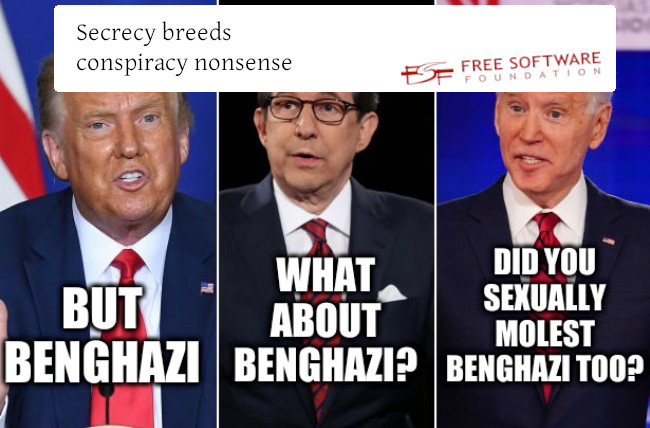
"The payments can be called "sponsorship" or "patronage" or whatever; there are strings attached to such money, especially if there's a prospect of annual renewal (subjected to periodic assessment and sometimes pre-imposed conditions)."In Part I, Part II, and Part III we explained that corporate impact or moneyed factors sought to steer institutions that would otherwise antagonise them. The payments can be called "sponsorship" or "patronage" or whatever; there are strings attached to such money, especially if there's a prospect of annual renewal (subjected to periodic assessment and sometimes pre-imposed conditions). This happens a lot in politics and it imperils free speech because of that 'sixth sense' about financial ramifications associated with the expression of particular views.
Just to be very clear right from the start/outset, the donors of the Free Software Foundation (FSF) are reasonably benign. It's nowhere as grotesque as what goes on at the OSI and Linux Foundation. This year and last year's page says a lot; the FSF's donors page suggests that they increasingly rely on members, not companies like Google and IBM. That's a positive thing.
 I am very saddened by the departure of Alex Oliva from the FSF. Having said that, he explained to me that it was a decision both himself and RMS (the FSF's founder) were generally OK with and I recently noticed that he had moved on to other very interesting endeavours. My main concern is that people inside the FSF falsely accused him of things he had never done. "I suppose you can see how easy it would be for someone to blame any leaks from within the FSF on me," he recently told me. Some leaks that we received (if those even qualify as leaks at all) were wrongly blamed on him. That's just beyond unfortunate. We've had many people with inside knowledge approach us over the years. My communications with Oliva are actually out there, in public, in open domains such as Diaspora. I don't need to speak to him privately to better understand what goes on at the FSF because he's very transparent about it -- to the point of causing himself trouble (as was the case after publishing the "GNU year" blog post). As he noted the other day, "you've seen how I'm striving to keep my commitments and obligations of confidence on FSF internal information I've had access to."
I am very saddened by the departure of Alex Oliva from the FSF. Having said that, he explained to me that it was a decision both himself and RMS (the FSF's founder) were generally OK with and I recently noticed that he had moved on to other very interesting endeavours. My main concern is that people inside the FSF falsely accused him of things he had never done. "I suppose you can see how easy it would be for someone to blame any leaks from within the FSF on me," he recently told me. Some leaks that we received (if those even qualify as leaks at all) were wrongly blamed on him. That's just beyond unfortunate. We've had many people with inside knowledge approach us over the years. My communications with Oliva are actually out there, in public, in open domains such as Diaspora. I don't need to speak to him privately to better understand what goes on at the FSF because he's very transparent about it -- to the point of causing himself trouble (as was the case after publishing the "GNU year" blog post). As he noted the other day, "you've seen how I'm striving to keep my commitments and obligations of confidence on FSF internal information I've had access to."
That's correct. Here in Techrights we publish almost everything, sometimes in mildly redacted form. This way we have very little to hide (except maybe names) and scrutiny can be done in the open, with no speculations necessary. People who are in IRC can see what happens almost in real time and those who just lurk or read IRC logs need to wait for (at most) 24 hours.
If this series reopens some old wounds or sores (or sores code), then fine. We strive to better understand what goes on at the FSF. Sometimes I debate these things openly with a whole bunch of people, including RMS. The FSF oughtn't try to guard its reputation by secrecy because such a strategy does not scale when dealing with panels or large teams which in turn speak outwards (with other people, those outside the circle of trust). In the next part we'll give an example of that. ⬆